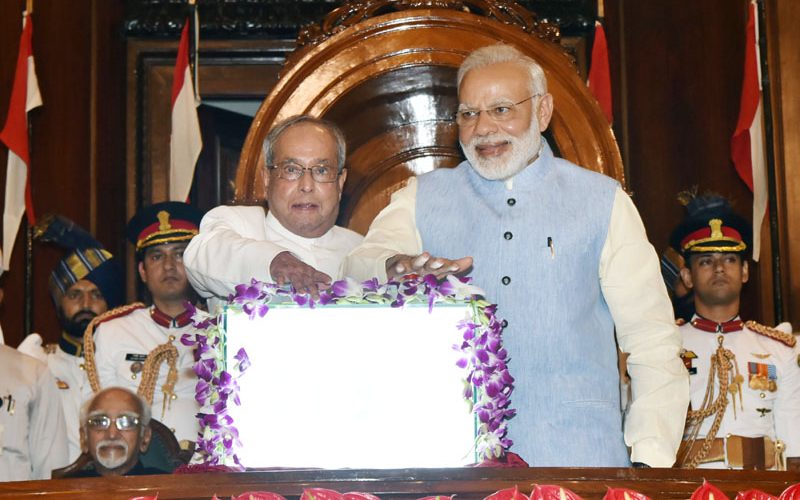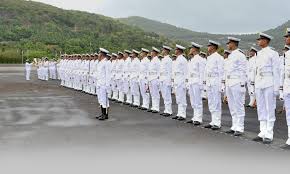“GST : a decisive turning point in determining the future course of the country ” Prime Minister Narendra Modi

At the stroke of the midnight of 30th June – 1st July 2017, President Pranab Mukherjee and Prime Minister Narendra Modi pressed a button on a glass box to mark the launch of GST which replaced more than a dozen state and central levies. President Pranab Mukherjee, Prime Minister Narendra Modi, and Finance Minister Arun Jaitley addressed the gathering before the launch. The country witnessed the launch of biggest ever tax reform since independence , when the Goods and Services Tax came into force amid a historic midnight session in the Central Hall of Parliament in New Delhi.
Speaking on the occasion, the Prime Minister said that the day marks a decisive turning point in determining the future course of the country. He recalled that the Central Hall had been witness to several historic occasions in the past as well, including the first meeting of the Constituent Assembly on December 9, 1946, country’s tryst with destiny on the midnight of August 14, 1947, and adoption of country’s Constitution on November 26, 1949. Calling GST, as a good and simple tax Mr. Modi said it will end harassment of traders and small businesses while integrating India into one market with one tax rate. He said that GST would lead to immense savings of time and cost. Savings of fuel due to elimination of delays at State border crossings will help the environment as well, he added. The Prime Minister said GST would lead to a modern tax administration which is simpler, more transparent, and helps curb corruption. He said, it will bring in a new culture of governance, ending the tax terrorism and inspector raj. The Prime Minister said that GST would make it easier for global investors to invest in the Indian market. He described GST as an economic integrator just like the integration of the nation by Sardar Vallabhai Patel after independence. Recalling the famous scientist Albert Einstein who said that income tax is the most difficult thing to understand in the world, he said that GST would ensure one nation, one tax. He described GST as an example of Cooperative Federalism. He said, with the launch of GST, Team India has proven its potential and diligence.
Describing GST a landmark achievement which is bound to take the nation towards exponential growth, the Prime Minister said, all states are slated to gain immensely as they will now get equal opportunities of development. The system not only provides impetus to already developed states but also provides the opportunity to the backward states to develop, he added. He said, under GST, for the first time, the central and the state governments will work together towards the same direction that is an example of -‘Ek Bharat Sreshtha Bharat’ and its impact will be appreciated by the forthcoming generations with a great pride. He equated the 18 meetings of the GST Council with that of the 18 chapters of Bhagvad Gita and also quoted philosopher and economist Chanakya to say that hard work can overcome all obstacles and help us accomplish even the most difficult of objectives. However, the Prime Minister acknowledged that there may be some initial hiccups, saying that even an eye takes time to adjust to sight corrective spectacles. He urged people not to pay attention to rumours and not create apprehensions about the new tax. He said that even though not everyone is familiar with technology, each family will have a Class X or XII student who can help carry out the GST compliance requirement of filing an online return each month.
President Pranab Mukherjee described the introduction of GST as a momentous event for the nation. He said, the new era in taxation is result of broad consensus arrived at between the Centre and States. He said, it is a tribute to the maturity and wisdom of India’s democracy.
The President mentioned in his speech the fourteen-year long journey of GST which began in December 2002, when the Kelkar Task Force on indirect taxation suggested a comprehensive Goods and Services Tax (GST) based on the Value Added Tax principle. He said, the proposal to introduce GST was first mooted in the Budget Speech for the financial year 2006-07. Since the proposal involved restructuring and reform of not only indirect taxes levied by the Centre but also the States, the responsibility of preparing a design and a plan of action for the implementation of GST was assigned to the Empowered Committee of State Finance Ministers which had been formed earlier for implementation of the Value Added Tax. The Empowered Committee released its First Discussion Paper on Goods and Services Tax in November, 2009. He said, the launch of GST was a moment of satisfaction for him personally because as Finance Minister he had introduced the Constitutional Amendment Bill for enabling the tax regime in 2011. Later, on 8th September 2016 as the President of India, Mr Mukherjee had given assent to the Constitution (One Hundred and First Amendment) Act, after the Bill was passed by both Houses of Parliament and more than 50 percent of State Legislatures.
Describing GST as a disruptive change, the President said when a change of this magnitude is undertaken, however positive it may be, there are bound to be some teething troubles and difficulties in the initial stages. Mr Mukherjee called upon every Indian to extend cooperation in the successful implementation of the new system.
The Union Finance Minister said, it is a journey where India will awake to limitless possibilities, to expand its economic horizons and loftier political vision. Mr Jaitley said, the GST may be a destination tax, but for India it will begin an altogether a new journey. The old India was economically fragmented, the ‘New India’ will create One Tax, One Market and for One Nation, he added. The Minister said, in a large and complex Federal System of Multi-Party Democracy with the Centre, 29 States, 2 Union Territories with legislatures, and wide divergent interest a Constitution Amendment was implemented and a large tax reform has been brought in that displays a high point of Indian politics. This has been done at a time when the world is facing slow growth, Isolationism and lack of structural reforms and the move has shown that these forces can be overcome through the display of inclusion, openness and boldness, he added.
Top leaders, industrialists, economists, bureaucrats and celebrities descended to witness the launch of landmark GST at the historic Central Hall of Parliament. The occasion was marked by the presence of Vice-President Hamid Ansari, Lok Sabha Speaker Sumitra Mahajan, former Prime Minister H D Deve Gowda, BJP President Amit Shah, almost entire Union Council of Ministers, MPs from the ruling alliance and opposition leaders from the Samajwadi Party, the BJD, the NCP and the JD(U). RBI Governor Urjit Patel, Industrialist Ratan Tata, along with Vijay Kelkar, who had first mooted the concept of GST in a report to finance ministry in 2003, was also present at the launch.
-Raveendran VP






